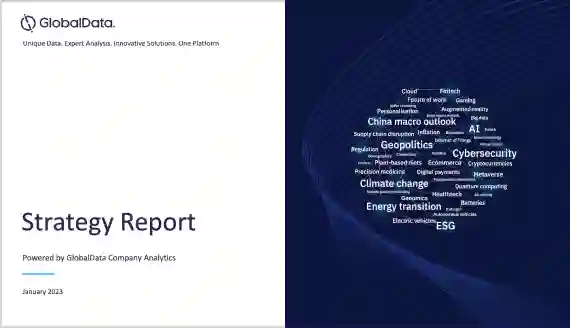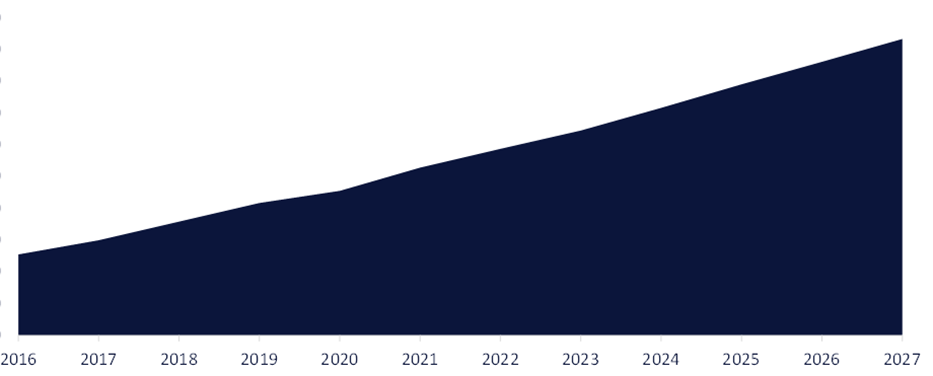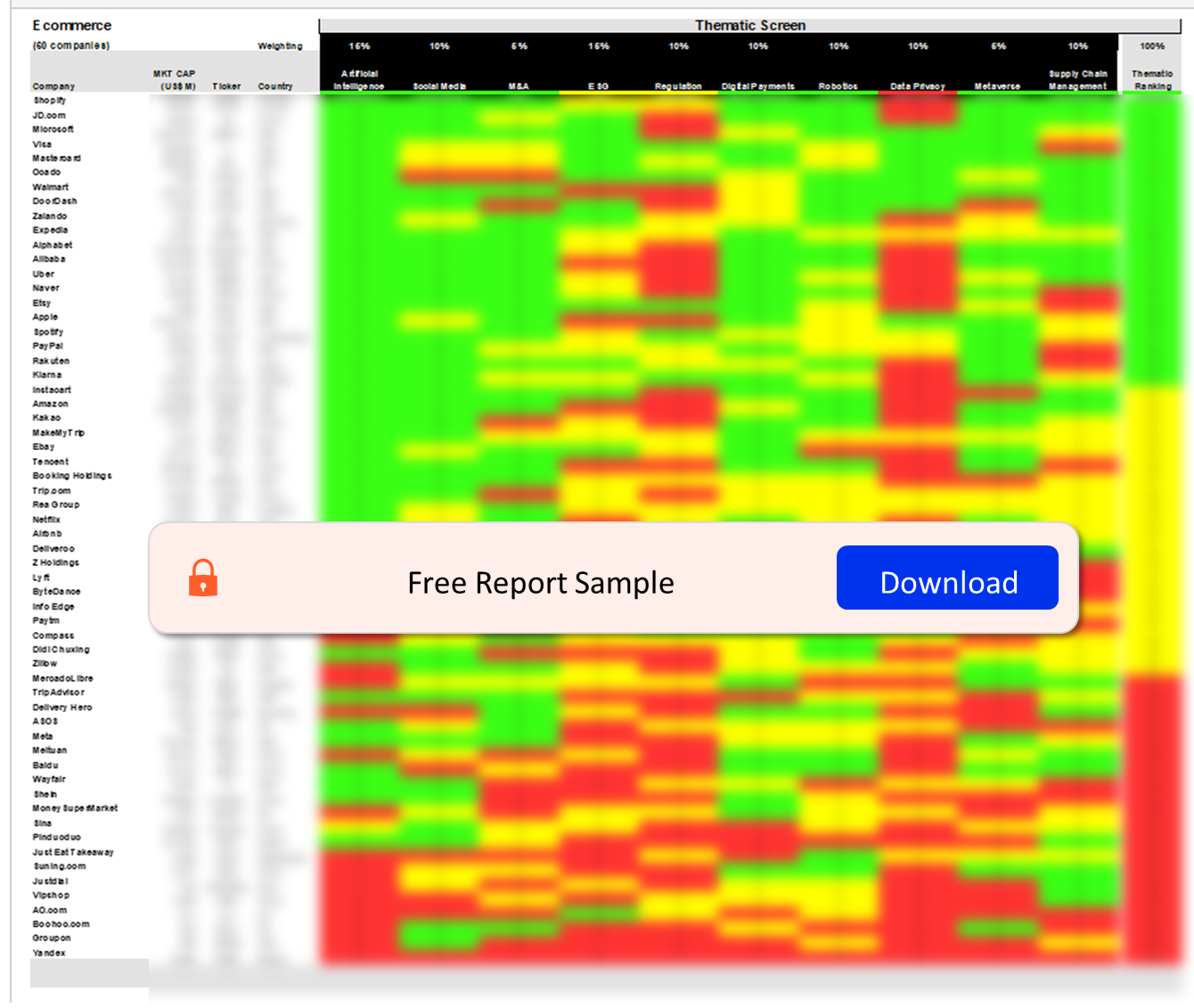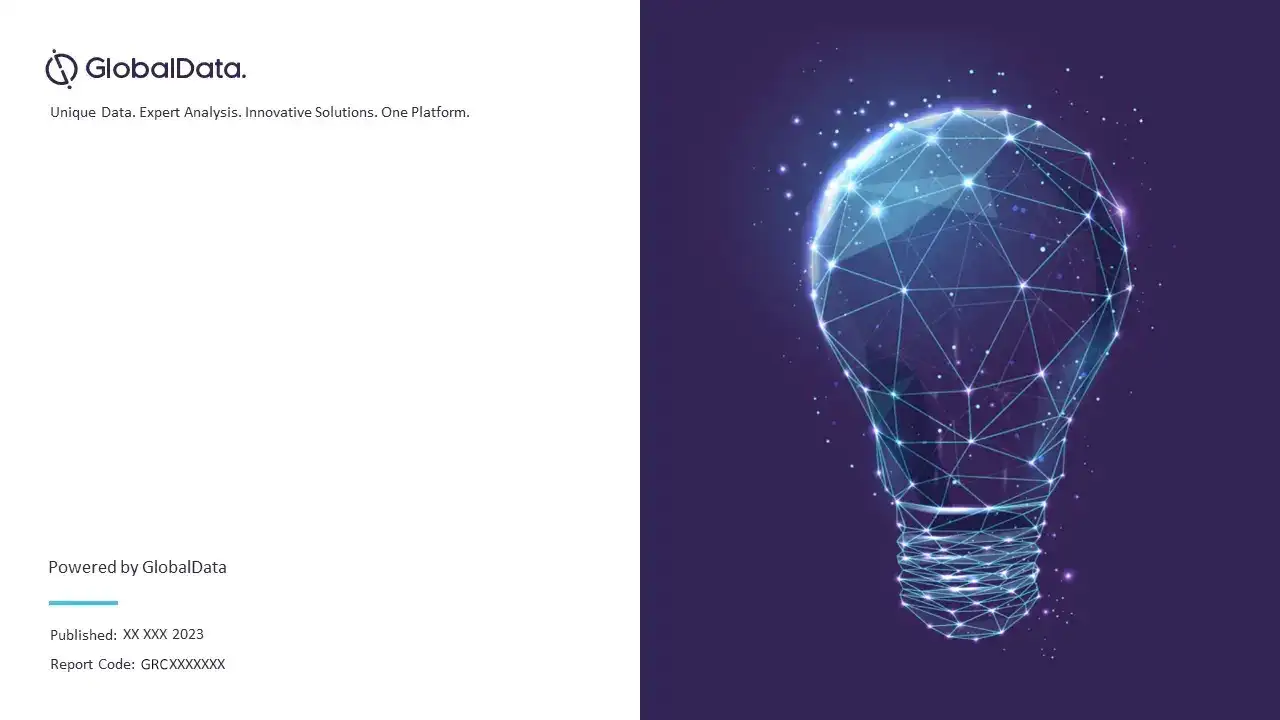Ecommerce – Thematic Intelligence
Powered by ![]()
All the vital news, analysis, and commentary curated by our industry experts.
Ecommerce Report Overview
The e-commerce market was worth $5.9 trillion in 2022 and is expected to expand at a compound annual growth rate (CAGR) of more than 9% between 2022 and 2027 primarily driven by improved technology and delivery services and wider internet adoption.
The E-commerce thematic report provides an overview of the e-commerce theme. It identifies the key trends impacting the growth of the sector over the next 12 to 24 months. It includes a comprehensive industry analysis, outlining the key growth areas and potential use cases.
| Total Pages | 56 |
| Market Size (2022) | $5.9 Trillion |
| CAGR (2022-2027) | >9% |
| Key Value Chain Components | · Marketing
· Customer Interface · Order Management · Transaction Processing · Fulfillment · After-Sales Service |
| Leading Listed Players | · Alibaba
· Alphabet (parent company of Google) · Amazon · Apple |
| Leading Private Players | · ByteDance
· Epic Games · Klarna · Shein |
| Enquire & Decide | Discover the perfect solution for your business needs. Enquire now and let us help you make an informed decision before making a purchase. |
Ecommerce Market Trends
The main trends shaping the e-commerce theme over the next 12 to 24 months are classified into technology trends, macroeconomic trends, and regulatory trends.
Technology Trends: Some of the key technology trends gaining traction in the e-commerce market include the rising internet super-monopoly by tech giants, booming subscription-based services for the grocery market, and increasing use of AI to both enhance the user experience and improve the data analysis process among others.
Macroeconomic Trends: Increasing number of M&A deals between the second-tier players in each discrete e-commerce industry, implementation of O2O business strategy, and growing consumer consciousness of the environmental impacts of the products are the key macroeconomic trends impacting the e-commerce market.
Regulatory Trends: Fintech regulations, tax avoidance by tech companies, and laws for data privacy such as GDPR are the prominent regulatory trends influencing the e-commerce market.
Buy the Full Report for More Insights on the E-commerce Market Trends
Ecommerce - Industry Analysis
Technology is changing the way businesses and consumers interact. E-commerce has disrupted the retail industry and has become a part of people’s everyday lives. Online shopping allows customers to search for the best deals across multiple retailers. The emergence of e-commerce has made it imperative that companies understand consumer behavior, deliver personalized service, and offer competitive pricing models.
There was a significant increase in the value of transactions between 2020 and 2021. The high growth rates during the COVID-19 pandemic came as global lockdowns prevented consumers from shopping in stores. The trend continued and the e-commerce industry was valued at $5.9 trillion in 2022 and is expected to expand at a CAGR of more than 9% between 2022 and 2027.
E-commerce giants like Alibaba and Amazon have written the rules for ecommerce, supported by huge customer bases, robust mobile payment platforms, and technology expertise in areas like AI. Smaller players focus on disruptive business models, such as subscription services, to make their mark.
The ecommerce industry analysis also comprises –
- Timeline
- Venture financing trends
- Patent trends
- Hiring trends
- Social media trends
Global Ecommerce Revenue (All Sectors), 2016-2027 ($ Trillion)
Buy the Full Report for More Insights on Industry Analysis in Ecommerce
Ecommerce Value Chain Insights
The e-commerce value chain comprises several discrete layers. Ecommerce as a service includes marketing, customer interface, order management, transaction processing, fulfillment, and after-sales service. These layers are underpinned by data analytics, which provides the backbone for all successful e-commerce operations. This section provides a comprehensive analysis of each of these layers.
Marketing: The starting point of a consumer’s e-commerce journey is their first exposure to a brand. This is achieved through a company’s marketing efforts. The primary channels for e-commerce companies are online advertising and social media. Companies have a wealth of online advertising resources at their disposal. Traditional online advertising is dominated by advertising technology (adtech) companies such as Google, whose Google AdWords serves adverts across its namesake search engine and through partner websites. E-commerce companies can also take advantage of newsletter marketing, with newsletter providers such as Klaviyo and Mailchimp offering a direct line of communication to consumers.
The E-commerce Value Chain Analysis
Buy Full Report for More Insights on the Value Chain in Ecommerce
Ecommerce Industry – Competitive Landscape
Some of the leading listed players associated with this ecommerce theme include:
- Alibaba
- Alphabet (parent company of Google)
- Amazon
- Apple
Some of the leading private players associated with this ecommerce theme include:
- ByteDance
- Epic Games
- Klarna
- Shein
Buy the Full Report for More Insights on Leading Players in Ecommerce
Ecommerce Sector Scorecard
The three screens in the industry scorecard comprise of –
Thematic Screen: The thematic screen ranks companies based on overall leadership in the 10 themes that matter most to their industry, generating a leading indicator of future performance.
Valuation Screen: The valuation screen ranks our universe of companies within a sector based on selected valuation metrics.
Risk Screen: The risk screen ranks companies within a particular sector based on overall investment risk.
Ecommerce Sector Scorecard Analysis
For Additional Insights on the Ecommerce Sector Scorecard Analysis
Scope
- This report provides an overview of the ecommerce theme.
- It identifies the key trends impacting the growth of the sector over the next 12 to 24 months, split into three categories: technology trends, macroeconomic trends, and regulatory trends.
- It includes a comprehensive industry analysis, complete with forecasts for the global ecommerce market and analysis of trends by sector, demography, and geography.
- It also incorporates a detailed look at the ecommerce value chain, which is made up of several discrete layers: ecommerce as a service, marketing, customer interface, order management, transaction processing, fulfillment, and after-sales service.
- The report also includes a timeline charting the development of the ecommerce theme, and profiles of the leading ecommerce companies.
Key Highlights
- COVID-19 was a crucial factor in the growth of ecommerce as pandemic lockdowns accelerated the shift to online shopping.
- Ecommerce allows companies to sell their products or services without needing a physical presence. Increased rents, exacerbated by high-interest rates, have made online real estate increasingly attractive.
- The ecommerce market has also been democratized by ecommerce as a service player, like Shopify, and marketplaces, such as Amazon and Alibaba, that allow anyone to become a merchant. As more and more sellers go online, the ecommerce landscape will continue to evolve to provide for the ever-expanding range of goods on offer.
Reasons to Buy
- Ecommerce has disrupted the retail industry and has become a part of people’s everyday lives. Online shopping allows customers to search for the best deals across multiple retailers. The emergence of ecommerce has made it imperative that companies understand consumer behavior, deliver personalized service, and offer competitive pricing models.
- E-commerce giants like Alibaba and Amazon have written the rules for ecommerce, supported by huge customer bases, robust mobile payment platforms, and technology expertise in areas like AI. Smaller players focus on disruptive business models, such as subscription services, to make their mark.
- Read this report to understand the ecommerce theme and gain insights into how it will develop in the coming years.
ACI Worldwide
Activision Blizzard
Adevinta
Afterpay
Airbnb
Alibaba
Alipay
Alphabet
Alteryx
Altria Group
Amazon
Amex
Ant Group
Apple
ASOS
Auto Trader
Autohome
Ayden
Baidu
Bilibili
Birchbox
BitPay
BlaBlaCar
Blackmores
Block
Blue Apron
Boden
Bolt Technology
Boohoo
Booking Holdings
Broadcom
Bundl Technologies (Swiggy)
ByteDance
Cacashop
Capital One Financial
CarGurus
CarMax
Cars.com
Carsales.com
Carvana
carwow
Cazoo
ChannelAdvisor
Clearpay
Clif Bar
Cloudera
Coca-Cola
CoinGate
CommerceHub
CompuServe
Convey
Coupang
Deliveroo
Delivery Hero
Didi Chuxing
Dineout Services
Disney
DoorDash
E*TRADE Financial
eBay
Edmunds
eDreams
Ele.me
Electronic Arts
Epic Games
Etsy
Everlane
Expedia
Experian
Fang
Flexport
Flipkart
Getir
Global Payments
GoBrands
GoDirect Trade
Gojek
Gorillas Technologies
GoTo Group
Grab
Grubhub
Gucci
H&M
Hays Travel
HelloFresh
Herbivore Botanicals
HIS
Home Depot
Honeywell
Huel
IBM
Ikea
Inditex
Informatica
Instacart
iQiyi
IronSource
JD Health International
JD.com
Just Eat Takeaway
Juul Labs
Kering
Kirin
Klarna
Klaviyo
Krafton
Kroger
Kuaishou
Lacoste
Lazada
Leju
Lime
L'Oreal
Lowe's
LVMH
Lyft
Mailchimp
Mastercard
Matchesfashion.com
Meituan
MercadoLibre
Meta
Michael Kors
Microsoft
Mondelēz International
Monica Vinader
Morgan Stanley
Myntra
Narvar
Naver
NEC
NetEase
Netflix
Netmarket
Nintendo
Ocado
Ola
OnTheMarket
OpenBazaar
OpenSea
Oracle
OYO
Paramount
Payline
PayPal
Paytm
PDD Holdings
Perfect World
Poshmark
PT Tokopedia
Qunar
Rakuten
REA Group
Reality Labs
Revolut
Richemont
Rightmove
Roblox
Samsung
SAS
Sephora
Sety
Share Now
Shein
Shopify
Sina Weibo
Skechers
Snap
Softbank Group
Sony
SpareRoom
Splunk
Spotify
Squarespace
Steam
Stripe
Swarovski
Swiggy
Swyft
Telegram
Tencent
Tesla
The New York Times
Thras.io
Threads
Tianjin Hut
TIER
Tiffany & Co
TikTok
Timberland
Tongcheng
Toshiba
Total System Services
Trailfinders
Travelodge
Trendyol
Trip.com
TripAdvisor
Trivago
TrueCar
Trulia
TUI
Turo
Uber
Unity Technologies
Universal Music
Visa
Vroom
Walmart
Warner Music
Wayfair
Wheely
Wolt Enterprises
WooComerce
Wordpress
WorldPay
Xbox
Yoox Net-a-Porter
Zalando
Zara
Zillow
Zomato
Zoopla
Table of Contents
Frequently asked questions
-
What was the size of the e-commerce industry in 2022?
The e-commerce industry was worth $5.9 trillion in 2022.
-
What is the e-commerce industry's growth rate?
The e-commerce industry is expected to expand at a compound annual growth rate (CAGR) of more than 9% between 2022 and 2027.
-
What are the key e-commerce industry trends?
The key e-commerce industry trends are technology, regulatory, and macroeconomic trends.
-
Who are the leading listed players associated with the e-commerce theme?
Some of the leading listed players associated with this e-commerce theme include Alibaba, Alphabet (parent company of Google), Amazon, and Apple among others.
-
Who are the leading private players associated with e-commerce themes?
Some of the leading private players associated with this e-commerce theme include ByteDance, Epic Games, Klarna, and Shein among others.
Get in touch to find out about multi-purchase discounts
reportstore@globaldata.com
Tel +44 20 7947 2745
Every customer’s requirement is unique. With over 220,000 construction projects tracked, we can create a tailored dataset for you based on the types of projects you are looking for. Please get in touch with your specific requirements and we can send you a quote.














